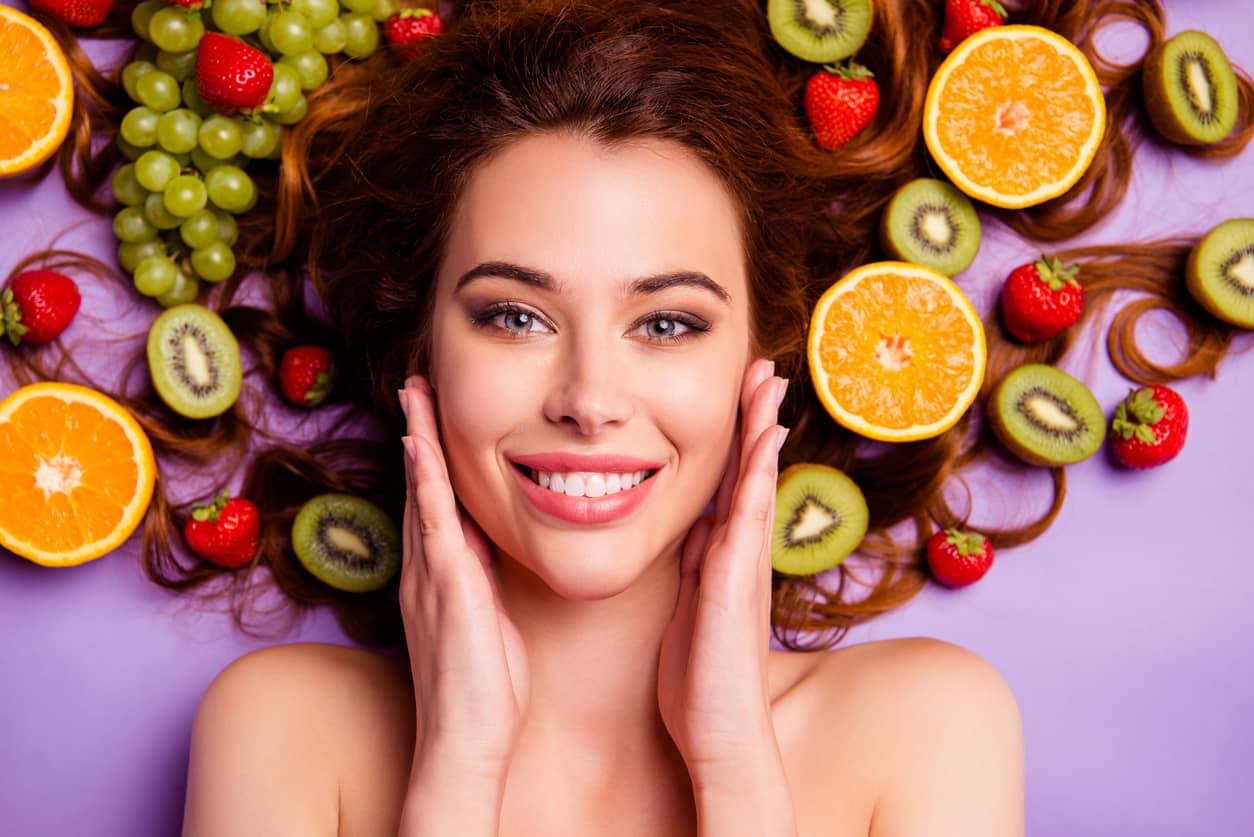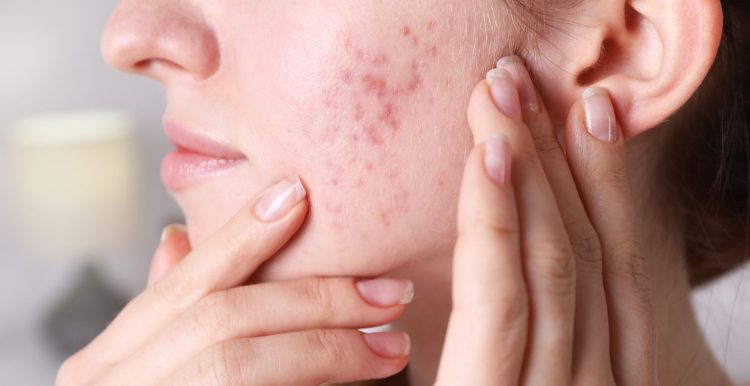Acne, those pesky blemishes that seem to appear out of nowhere, often leave us scratching our heads wondering, What went wrong? While we’re often quick to blame hormones, stress, or even our skincare routines, one key factor is sometimes overlooked—our diet. It may sound surprising, but what we eat can significantly affect the health of our skin. So, could your diet be the hidden culprit behind your breakouts?
In this article, we’ll explore the connection between diet and acne, the foods that may trigger flare-ups, and how you can adjust your eating habits to get clearer, healthier skin. Whether you’re struggling with persistent pimples or just curious about the impact of food on your complexion, this guide will give you the insights you need to better understand how your diet might be influencing your skin.
The Science Behind Acne and Diet
Before we dive into specific foods, let’s first understand the science behind acne. Acne occurs when hair follicles become clogged with oil, dead skin cells, and sometimes bacteria. This creates an environment where inflammation thrives, leading to the formation of pimples, blackheads, or cysts.
While genetics and hormones are the leading causes of acne, environmental factors like stress, pollution, and, yes, diet, can exacerbate these conditions. So, how exactly does what we eat impact acne?
1. Insulin and Inflammation
Certain foods, particularly those that spike your blood sugar levels, can trigger an increase in insulin production. High insulin levels promote the production of sebum (skin oil), which is a key factor in clogged pores and acne development. Foods that are high on the glycemic index, like sugary snacks and refined carbs, can lead to these insulin spikes and inflammation, setting the stage for breakouts.
2. Hormonal Imbalance
Dietary choices can also affect our hormone levels, which play a major role in acne. For example, dairy products are believed to influence the production of androgens, male hormones that can increase oil production in the skin, leading to clogged pores. On the other hand, a balanced, nutrient-dense diet helps regulate hormones and reduces the risk of hormonal acne.
3. Antioxidants and Skin Health
A diet rich in antioxidants helps fight oxidative stress, which can damage skin cells and increase inflammation. Anti-inflammatory foods can also help calm redness and swelling associated with acne. Foods like berries, leafy greens, and healthy fats are high in antioxidants, offering your skin the nutrients it needs to stay clear and vibrant.
4. Gut Health and Acne
Emerging research suggests that the health of your gut microbiome may play a crucial role in the appearance of your skin. An imbalance of bacteria in the gut can trigger systemic inflammation, which could, in turn, cause or worsen acne. Foods rich in prebiotics and probiotics, like fermented vegetables and yogurt, can promote gut health and may help keep your skin clear.

Foods That Could Trigger Breakouts
Now that we understand the science behind acne, let’s take a look at some foods that may be contributing to your skin issues. By identifying potential triggers, you can make more informed decisions about your diet and its impact on your complexion.
1. Sugary Foods and Refined Carbohydrates
When you consume sugar and processed carbs (think white bread, pasta, pastries), your blood sugar levels spike, which leads to a surge in insulin. This, in turn, can cause an increase in sebum production. High insulin levels also promote inflammation, which is a key factor in acne development.
- Examples: Soda, candy, white bread, chips, sugary breakfast cereals, baked goods.
2. Dairy Products
While dairy may be an excellent source of calcium and protein, it has been linked to increased acne, particularly in individuals who are sensitive to it. The hormones in milk, particularly cow’s milk, are thought to stimulate the production of sebum, exacerbating acne. Studies suggest that skim milk is more likely to trigger breakouts than whole milk due to its higher insulin-like growth factor (IGF-1) content.
- Examples: Milk, cheese, yogurt, ice cream.
3. Processed Meats and Fast Food
Processed meats and fast food tend to be high in unhealthy fats and refined oils, which can contribute to inflammation in the body. These fats can also lead to an imbalance in your skin’s oil production, clogging pores and potentially triggering acne.
- Examples: Bacon, sausages, hot dogs, fast food burgers, fried chicken.
4. Chocolate (in Excess)
There’s a longstanding debate about chocolate and its connection to acne, with some believing that chocolate causes breakouts. While the relationship isn’t fully understood, some studies suggest that eating too much chocolate, especially milk chocolate, can lead to an increase in acne due to the sugar content and dairy. Dark chocolate, on the other hand, is less likely to trigger acne as it has fewer sugars and dairy products.
- Examples: Milk chocolate bars, chocolate candies.
5. High-Sodium Foods
Too much salt in your diet can dehydrate the skin and make it more prone to oil production and clogged pores. Processed and packaged foods, such as canned soups, chips, and frozen dinners, tend to be high in sodium, which can negatively affect skin health.
- Examples: Fast food, packaged snacks, processed meats.
Acne-Fighting Foods to Add to Your Diet
If you’re ready to make a change, it’s important to know what foods can help support healthy skin. A diet rich in certain nutrients can promote clearer skin and reduce inflammation, helping to keep acne at bay.
1. Omega-3 Fatty Acids
Omega-3 fatty acids are powerful anti-inflammatory nutrients that can help reduce the redness and swelling associated with acne. These fats also play a role in regulating oil production in the skin. You can find omega-3s in foods like fatty fish, walnuts, and flaxseeds.
- Examples: Salmon, sardines, chia seeds, flaxseeds, walnuts.

2. Zinc-Rich Foods
Zinc is a mineral that has been shown to reduce acne by decreasing inflammation and regulating oil production. It can also help in the healing process of existing breakouts. Foods rich in zinc include meat, shellfish, legumes, and seeds.
- Examples: Oysters, pumpkin seeds, lentils, chickpeas, beef.
3. Antioxidant-Rich Fruits and Vegetables
Eating a variety of colorful fruits and vegetables can provide your skin with the antioxidants it needs to combat oxidative stress and inflammation. These antioxidants can help repair damaged skin cells, reduce redness, and improve overall skin health.
- Examples: Blueberries, spinach, kale, tomatoes, sweet potatoes.
4. Probiotics for Gut Health
As mentioned earlier, your gut health is linked to your skin’s appearance. Adding probiotics to your diet can help balance the microbiome, reduce inflammation, and improve acne. Fermented foods are an excellent source of probiotics.
- Examples: Yogurt, kefir, sauerkraut, kimchi, miso.
5. Vitamin A and Beta-Carotene
Vitamin A is vital for skin health, as it helps with skin cell turnover and prevents clogged pores. Beta-carotene, a precursor to vitamin A, can be found in colorful fruits and vegetables and provides a boost to your skin’s health by reducing inflammation and promoting healing.
- Examples: Carrots, sweet potatoes, spinach, red bell peppers.
Building a Skin-Friendly Diet
Now that you know which foods to avoid and which ones to embrace, here’s how to build a diet that supports your skin’s health:
1. Balance Your Blood Sugar
Keep your blood sugar levels steady by avoiding foods that cause spikes and crashes. Opt for whole grains, legumes, and low-glycemic fruits like berries, apples, and pears.
2. Focus on Healthy Fats
Incorporate healthy fats into your diet to support skin hydration and reduce inflammation. Avocados, olive oil, nuts, and seeds are great sources of healthy fats.
3. Stay Hydrated
Water is essential for keeping your skin hydrated and flushing out toxins. Drink plenty of water throughout the day, and consider adding water-rich foods like cucumbers, watermelon, and oranges to your diet.
4. Consider Supplements
Certain supplements, like omega-3s, zinc, and probiotics, may support skin health. However, it’s always a good idea to consult with a healthcare provider before adding supplements to your routine.
Final Thoughts
Your skin is a reflection of your overall health, and what you put into your body plays a significant role in how it looks. While diet alone may not be the sole factor contributing to acne, a balanced, nutrient-dense diet can go a long way in reducing breakouts and promoting clearer skin.
If you’ve been struggling with acne and suspect your diet might be to blame, consider making small adjustments to see how your skin reacts. Start by cutting back on processed foods, dairy, and sugary snacks, while incorporating more antioxidant-rich fruits, omega-3 fatty acids, and probiotics. With time and consistency, you may just find the clear skin you’ve been searching for.












































